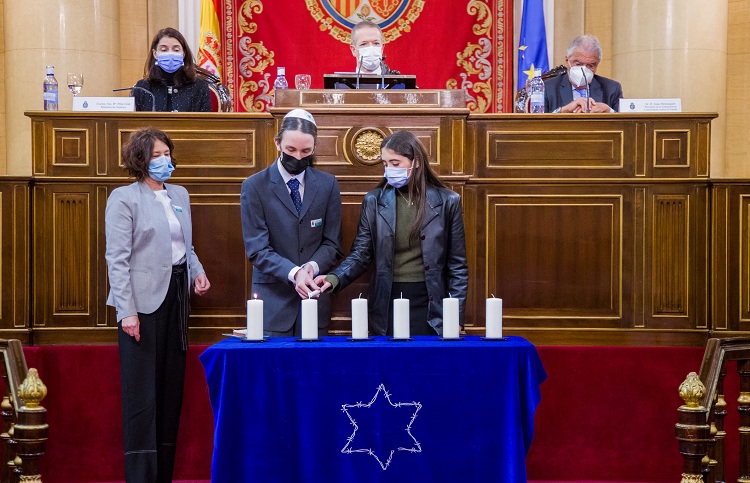The Diplomat
The Old Session Hall of the Senate hosted yesterday, once again, the Official Day of Remembrance of the Holocaust and the Prevention of Crimes against Humanity, in commemoration of the 77th anniversary of the liberation of the Auschwitz-Birkenau extermination camp.
The event was attended by the President of the Senate, Ander Gil; the Minister of Justice, Pilar Llop; the Director General of Centro Sefarad-Israel and Head of the Spanish Delegation to the International Holocaust Remembrance Alliance, Miguel de Lucas; the President of the Federation of Jewish Communities of Spain (FCJE), Isaac Benzaquén; the Director of the Institute of Gypsy Culture, Diego Luis Fernández; and the Vice-President of Amical Mauthausen and other camps, Concepción Díaz Berzosa.
The event included several musical performances, the lighting of six candles (in memory of the six million Jews, the million and a half Jewish children and the rest of the groups murdered by the Nazis, as well as the Righteous Among the Nations, the survivors and the rejection of denialism and hatred), a minute of silence and the prayer for the victims of the Holocaust Male Rajaminh, by Rabbi Moshe Bendahan.
Spain established the Official Day of Remembrance of the Holocaust and the Prevention of Crimes against Humanity in 2005, in line with the United Nations General Assembly resolution that proclaimed January 27 as the International Day of Annual Commemoration of the Memory of the Holocaust.
“The memory of the Holocaust must be a teaching, an element that strengthens our democracies,” said Pilar Llop. “Our responsibility and obligation is to preserve the memory, but also to educate and sensitize new generations to respect and tolerance for others, for other ways of living, of thinking, of expressing themselves,” she continued. “We cannot let our guard down; we must always be alert to the new hate speeches that are dangerously present in our society,” she concluded.
For his part, Ander Gil warned of the need to “combat the spokesmen of negationism and activists of indifference” and recalled that, in Spain, Francoism closed the borders to Jewish refugees and more than 8,000 Spanish Republicans were deported to concentration camps, where most of them died.
Representing the Jewish victims, Isaac Benzaquén recalled that the origin of the Holocaust was the fierce anti-Semitism that reigned in Europe, especially in Germany in the 1930s, something that must be remembered so that it does not happen again. The best instrument to prevent barbarism, according to the president of the Spanish Jews, is education and the inclusion of the study and remembrance of the Holocaust in school curricula. “Let us make the Holocaust an instrument to consolidate our democracy and strengthen fundamental rights,” he added.
On behalf of the Roma victims, Diego Luis Fernández recalled that the Roma people were murdered just because they were Roma and warned that, at present, the group continues to “feel the persecution”. For this reason, she affirmed, the gypsy issue is “a question of social and political recognition” and, in this sense, “Spain is the European country with the greatest possibility of influencing other countries to recognize the gypsy people”.
Concepción Díaz Berzosa recalled the Spanish deportees in the Nazi concentration camps because “it will never be enough to remember that the strategy of Nazism is based on oblivion”. According to Berzosa, we are currently living in “worrying times”, with anti-Semitic graffiti in the streets, attacks on the headquarters of organizations and symbolic monuments and swastikas in the streets. “This must be denounced to defend democracy,” she warned.






